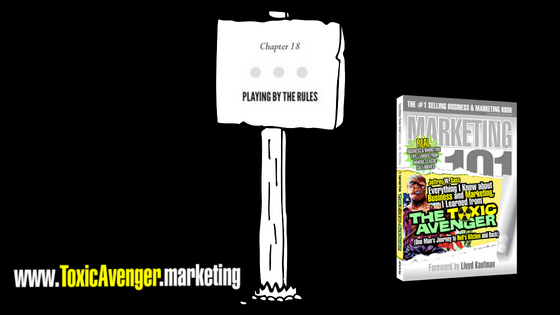Chapter 18: Playing By The Rules
Greetings from Tromaville! Here is Chapter 18 from my book, Everything I Know about Business and Marketing, I Learned from THE TOXIC AVENGER. In this chapter, we take a look at the importance of having some basic rules as a way of aligning your team.
If you haven’t done so already, you can read the Foreword by Troma co-founder, Lloyd Kaufman, and the Introduction to the book as well as Chapter 1, 2, 3, 4, 5 and 6, 7 ,8, 9, 10, 11, 12, 13, 14, 15, 16 and 17. You can also see me read a few chapters live, along with Lloyd and Toxie, at Florida Supercon as well as a few chapters I read on Facebook Live. Stay tuned for additional chapters to be published here. If you like what you read and can’t wait for more, please don’t be shy. You can buy the book now on Amazon (and also please don’t be shy about sharing, and reviewing the book when you do read it.) Both Toxie and I greatly appreciate your support! – Jeff Sass
Chapter 18: Playing By The Rules
By now you may be thinking that things were fairly loosey-goosey in Tromaville, with inexperienced young lads and lasses running wild and wreaking havoc. You would be mostly correct. In truth, while there were certainly some wild and crazy times (and even more wild and crazy characters and personalities), much of the working of the Troma machine was actually quite well-oiled. There were processes and procedures, and there were rules. In particular, there were the “Rules of Production.”
On every Troma movie set, in numerous, highly visible locations, the following sign was always posted:
Rules of Production:
1. Safety to people
2. Safety to property
3. Make a good film!
This was key. This was important. These were the rules Troma lived by on set, and at any given moment, Lloyd could walk up to a member of the cast or crew and quiz them on these three simple rules, and they had better know them. When it came to setiquette (etiquette on the set), the Troma Team was very clear on their priorities. A film set can be a dangerous place. There are lights, there are cameras, and there is action—big heavy things that can fall on people, miles of cables and electrical cords strewn about, vehicles, explosives, and lots of people around. A lot can go wrong. A lot does go wrong. It is a tribute to the dedication to these three “rules of production” that in over forty years and dozens of productions, Troma has a solid record and reputation when it comes to safety.
Safety to people is the number one priority. Safety to property is second. We were grateful for the fair deals we received on the equipment we borrowed or rented. We were forever grateful for the folks who generously let us use their homes and businesses as sets and locations for filming. The least we could do was to respect their property and do all we could to leave it in the same condition it was in when we arrived (which, frankly, was often no small task).
Finally, the third rule was to “make a good film” and in practice, if you paid attention to the first two rules, you were far more likely to succeed on the third.
These were good lessons in focus and culture. While a Troma film set consisted of a wild and varied sampling of human existence, a seemingly random collection of delightfully disparate souls, the one thing that they all had to have in common was respect for and adherence to the “Rules of Production.” Anyone who could not live up to these three simple concepts did not belong (and did not last long).
While in some cases, rules can be restrictive, when they are simple, direct, and core to your objective, a few good rules can help bind your team together and help keep things moving forward in a positive way. If it can work for Troma, it can work for you.
What are your business’s “rules of production”?
•••
That’s Chapter 18 – Do you also have common guidelines you could be using for your business, to help keep everyone on the same page? Stay tuned for “Chapter 19: “Fix it, or Forget it… FAST!” which explores the importance of having a “plan b” and thinking creatively on the spot…
The book in previous posts:
Foreword, by Lloyd Kaufman
Introduction: Lights, Camera, Action!
Chapter 1: Welcome to Tromaville!
Chapter 2: The Troma Building
Chapter 3: Meet the Moguls
Chapter 4: Trailer Trash
Chapters 5 and 6: Working FREE-lance & Becoming a Full-time Tromite
Chapter 7: Branding Begins on the Ground Floor
Chapter 8: The Power of We
Chapter 9: Old Yeller (and Be Your Brand)
Chapter 10: Find Something to Believe In
Chapter 11: Show Up!
Chapter 12: Sink or Swim!
Chapter 13: Embrace your Vision and Culture!
Chapter 14: Strategic Partners – Burn Houses, Not Bridges
Chapter 15: If You Don’t Want to Swallow a Frog, Start with a Stunt
Chapter 16: Repurpose, On Purpose!
Chapter 17: Always Salute the Schwag!




